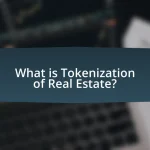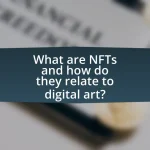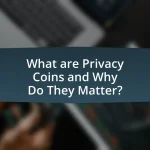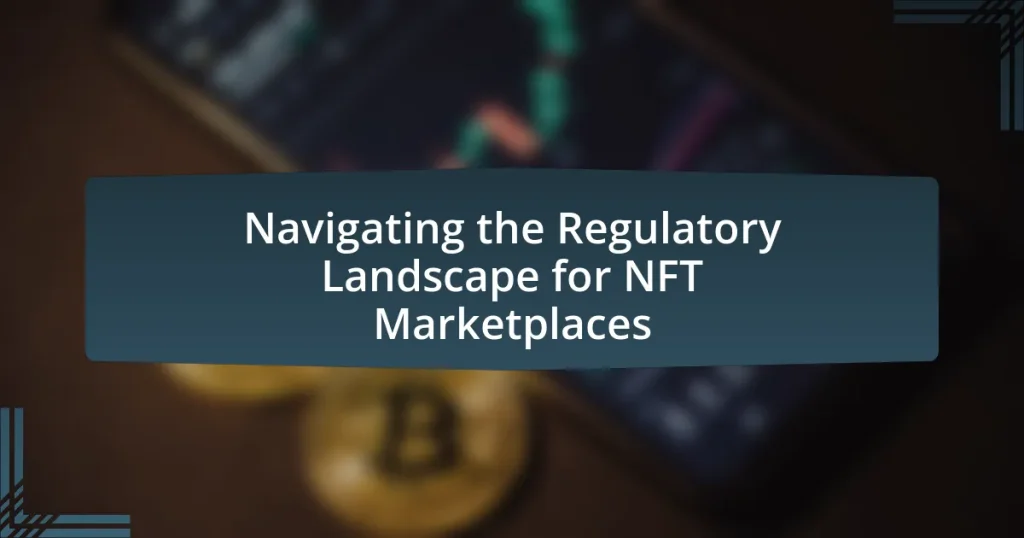The article focuses on the regulatory landscape for NFT marketplaces, highlighting the complex and evolving legal frameworks that govern these platforms across different jurisdictions. It examines how regulations, such as those from the U.S. Securities and Exchange Commission and the European Union’s Markets in Crypto-Assets framework, impact the classification of NFTs, operational compliance, and consumer protection. Key regulatory challenges, including anti-money laundering laws and intellectual property rights, are discussed, along with the importance of compliance for marketplace operators to mitigate legal risks and enhance user trust. The article also explores future trends in regulation and best practices for NFT marketplace operators to navigate this dynamic environment effectively.

What is the Regulatory Landscape for NFT Marketplaces?
The regulatory landscape for NFT marketplaces is characterized by a patchwork of existing laws and emerging regulations that vary significantly by jurisdiction. In the United States, NFTs may be classified as securities under the Howey Test, which assesses whether an asset is an investment contract based on the expectation of profits from the efforts of others. This classification can subject NFT marketplaces to securities regulations enforced by the Securities and Exchange Commission (SEC). In Europe, the Markets in Crypto-Assets (MiCA) regulation aims to create a comprehensive framework for digital assets, including NFTs, focusing on consumer protection and market integrity. Additionally, anti-money laundering (AML) and know-your-customer (KYC) regulations are increasingly being applied to NFT platforms globally to prevent illicit activities. These evolving regulations reflect the need for clarity and consumer protection in a rapidly growing market.
How do regulations impact NFT marketplaces?
Regulations significantly impact NFT marketplaces by establishing legal frameworks that govern transactions, ownership rights, and consumer protections. These regulations can dictate how NFTs are classified, whether as securities or digital assets, influencing the operational structure of marketplaces. For instance, the U.S. Securities and Exchange Commission (SEC) has indicated that certain NFTs may fall under securities laws, requiring marketplaces to comply with registration and reporting obligations. This compliance can lead to increased operational costs and necessitate changes in business models. Additionally, regulations aimed at preventing money laundering and fraud can impose stringent Know Your Customer (KYC) and Anti-Money Laundering (AML) requirements on NFT platforms, affecting user accessibility and transaction speed. Overall, regulatory frameworks shape the operational landscape of NFT marketplaces, impacting their growth, user engagement, and market stability.
What are the key regulatory bodies overseeing NFT marketplaces?
The key regulatory bodies overseeing NFT marketplaces include the Securities and Exchange Commission (SEC) in the United States, the Financial Conduct Authority (FCA) in the United Kingdom, and the European Securities and Markets Authority (ESMA) in the European Union. These organizations are responsible for enforcing regulations related to securities, consumer protection, and financial markets, which can impact how NFTs are classified and traded. For instance, the SEC has indicated that certain NFTs may be considered securities, thus falling under its jurisdiction, while the FCA has issued guidance on the regulation of crypto assets, including NFTs.
How do different jurisdictions approach NFT regulation?
Different jurisdictions approach NFT regulation with varying degrees of specificity and focus. For instance, the United States primarily views NFTs through the lens of existing securities laws, with the SEC indicating that some NFTs may qualify as securities depending on their characteristics and the expectations of profit. In contrast, the European Union is working on a comprehensive regulatory framework that includes NFTs under the Markets in Crypto-Assets Regulation, aiming to provide clarity on their legal status and consumer protections. Meanwhile, countries like Singapore have adopted a more flexible approach, encouraging innovation while ensuring compliance with anti-money laundering regulations. These diverse regulatory stances reflect each jurisdiction’s priorities, balancing innovation with consumer protection and financial stability.
Why is understanding regulations important for NFT marketplace operators?
Understanding regulations is crucial for NFT marketplace operators to ensure compliance and mitigate legal risks. Non-compliance can lead to significant penalties, including fines and operational shutdowns, as evidenced by various enforcement actions taken by regulatory bodies against platforms that failed to adhere to existing laws. For instance, the SEC has actively pursued cases against companies in the cryptocurrency space for securities violations, highlighting the importance of understanding how NFTs may be classified under securities law. Additionally, regulations can impact user trust and market reputation; operators that prioritize regulatory compliance are more likely to attract users who value security and legitimacy in their transactions.
What risks do NFT marketplace operators face without compliance?
NFT marketplace operators face significant legal and financial risks without compliance, including potential fines, legal action, and loss of business licenses. Non-compliance with regulations such as anti-money laundering (AML) and know your customer (KYC) laws can lead to investigations by regulatory bodies, resulting in hefty penalties. For instance, in 2021, the Financial Crimes Enforcement Network (FinCEN) imposed fines on companies failing to adhere to AML regulations, highlighting the financial repercussions of non-compliance. Additionally, operators may face reputational damage, which can deter users and investors, ultimately affecting profitability and market position.
How can compliance enhance user trust and marketplace reputation?
Compliance enhances user trust and marketplace reputation by ensuring adherence to legal and ethical standards, which fosters a secure environment for transactions. When NFT marketplaces implement compliance measures, such as data protection regulations and anti-money laundering protocols, they demonstrate a commitment to safeguarding user interests. This transparency and accountability can lead to increased user confidence, as evidenced by a 2021 survey from PwC, which found that 78% of consumers are more likely to trust companies that comply with regulations. Consequently, a strong compliance framework not only mitigates risks but also elevates the marketplace’s credibility, attracting more users and enhancing overall reputation.

What are the Current Regulatory Challenges for NFT Marketplaces?
Current regulatory challenges for NFT marketplaces include the lack of clear legal definitions and frameworks governing digital assets, which creates uncertainty for operators and users. Regulatory bodies in various jurisdictions are still determining whether NFTs should be classified as securities, commodities, or something else entirely, leading to inconsistent regulations. Additionally, issues related to intellectual property rights, consumer protection, and anti-money laundering compliance further complicate the operational landscape for NFT platforms. For instance, the U.S. Securities and Exchange Commission has indicated that some NFTs may fall under securities regulations, which could impose significant compliance burdens on marketplaces.
What specific regulations affect NFT transactions?
NFT transactions are primarily affected by regulations related to securities, anti-money laundering (AML), and consumer protection. The U.S. Securities and Exchange Commission (SEC) has indicated that certain NFTs may be classified as securities if they meet the criteria of an investment contract, which would subject them to securities regulations. Additionally, the Financial Crimes Enforcement Network (FinCEN) requires NFT platforms to comply with AML regulations, including customer identification and reporting suspicious activities. Consumer protection laws also apply, ensuring that buyers are informed about the nature and value of the NFTs they purchase. These regulations aim to create a safer marketplace and protect consumers from fraud and financial risks.
How do anti-money laundering (AML) laws apply to NFT marketplaces?
Anti-money laundering (AML) laws apply to NFT marketplaces by requiring them to implement measures to prevent, detect, and report suspicious activities related to money laundering and terrorist financing. NFT marketplaces are increasingly being classified as virtual asset service providers (VASPs), which subjects them to regulatory obligations similar to those imposed on traditional financial institutions.
For instance, under the Financial Action Task Force (FATF) guidelines, NFT marketplaces must conduct customer due diligence (CDD), monitor transactions for unusual patterns, and report any suspicious transactions to relevant authorities. This regulatory framework aims to enhance transparency and accountability in the rapidly evolving digital asset space, ensuring that NFT transactions do not facilitate illicit activities.
What role do consumer protection laws play in NFT sales?
Consumer protection laws play a crucial role in NFT sales by ensuring that buyers are safeguarded against fraud, misrepresentation, and unfair practices. These laws require transparency in transactions, mandating that sellers provide accurate information about the NFTs, including ownership rights and any associated risks. For instance, the Federal Trade Commission (FTC) in the United States enforces regulations that prohibit deceptive advertising and require clear disclosures, which directly impacts how NFTs are marketed and sold. Additionally, consumer protection laws can facilitate dispute resolution, allowing buyers to seek remedies in cases of non-compliance or fraud, thereby fostering trust in the NFT marketplace.
How are intellectual property rights addressed in NFT regulations?
Intellectual property rights in NFT regulations are primarily addressed through the recognition that NFTs can represent ownership of digital assets, but do not inherently confer copyright or trademark rights. Regulations often clarify that the creator of the NFT retains the intellectual property rights unless explicitly transferred, which is typically outlined in the terms of service or smart contracts associated with the NFT. For instance, the U.S. Copyright Office has indicated that copyright protection applies to the underlying work, not the NFT itself, emphasizing the need for clear agreements regarding rights transfer. This distinction is crucial for both creators and buyers to understand their legal rights and obligations in the NFT marketplace.
What challenges do creators face regarding copyright in NFTs?
Creators face significant challenges regarding copyright in NFTs, primarily due to the ambiguity surrounding ownership rights and the potential for copyright infringement. The decentralized nature of blockchain technology complicates the enforcement of copyright laws, as creators may struggle to prove ownership of their digital works when they are tokenized as NFTs. Additionally, the ease of copying and distributing digital content raises concerns about unauthorized use, leading to potential legal disputes. According to a report by the World Intellectual Property Organization, the rapid growth of NFTs has outpaced existing copyright frameworks, highlighting the need for clearer regulations to protect creators’ rights effectively.
How can NFT marketplaces ensure compliance with IP laws?
NFT marketplaces can ensure compliance with IP laws by implementing robust verification processes for the intellectual property rights of digital assets listed on their platforms. This includes requiring sellers to provide proof of ownership or licensing agreements for the content they are tokenizing, thereby reducing the risk of infringing on existing copyrights or trademarks. Additionally, marketplaces can establish clear guidelines and policies that outline the responsibilities of users regarding IP rights, and they can incorporate automated tools to detect potential infringements. Legal frameworks, such as the Digital Millennium Copyright Act (DMCA), can also be utilized to address and resolve IP disputes effectively, ensuring that the marketplace operates within legal boundaries.

What Future Trends Can We Expect in NFT Marketplace Regulations?
Future trends in NFT marketplace regulations will likely focus on increased transparency, consumer protection, and compliance with existing financial regulations. Regulatory bodies are expected to implement clearer guidelines regarding the classification of NFTs as securities or commodities, which will influence how marketplaces operate. For instance, the U.S. Securities and Exchange Commission has indicated that certain NFTs may fall under securities laws, prompting marketplaces to adapt their practices accordingly. Additionally, as the market matures, there will be a push for standardized practices around anti-money laundering (AML) and know your customer (KYC) protocols to enhance security and trust. These trends are driven by the need to protect consumers and ensure the integrity of the financial system as NFT transactions grow in volume and complexity.
How might upcoming legislation shape the NFT marketplace landscape?
Upcoming legislation is likely to introduce clearer regulatory frameworks for the NFT marketplace, impacting how transactions are conducted and how creators and buyers interact. This shift may enforce compliance with consumer protection laws, anti-money laundering regulations, and intellectual property rights, thereby increasing trust and security within the marketplace. For instance, the proposed regulations in the European Union’s Markets in Crypto-Assets (MiCA) framework aim to provide a comprehensive legal structure for digital assets, including NFTs, which could standardize practices across member states and enhance market stability.
What potential regulations are being discussed globally?
Potential regulations being discussed globally for NFT marketplaces include frameworks addressing consumer protection, anti-money laundering (AML), and taxation. Various countries are considering implementing specific guidelines to ensure transparency and security in transactions involving non-fungible tokens. For instance, the European Union is working on the Markets in Crypto-Assets (MiCA) regulation, which aims to create a comprehensive regulatory framework for digital assets, including NFTs. Additionally, the Financial Action Task Force (FATF) has recommended that countries apply AML regulations to virtual asset service providers, which would encompass NFT platforms. These discussions reflect a growing recognition of the need for regulatory oversight in the rapidly evolving NFT market.
How can NFT marketplaces prepare for future regulatory changes?
NFT marketplaces can prepare for future regulatory changes by implementing robust compliance frameworks and staying informed about evolving regulations. Establishing a dedicated compliance team ensures that marketplaces can adapt to new laws and guidelines as they emerge. Regularly conducting risk assessments and audits helps identify potential regulatory gaps, allowing for proactive adjustments. Engaging with legal experts and industry associations provides insights into upcoming regulatory trends, fostering a culture of compliance. Additionally, transparent communication with users about policies and changes enhances trust and aligns with regulatory expectations. These strategies are essential for navigating the complex and dynamic regulatory landscape surrounding NFTs.
What best practices should NFT marketplace operators follow to navigate regulations?
NFT marketplace operators should implement comprehensive compliance strategies to navigate regulations effectively. This includes conducting thorough legal assessments to understand applicable laws, such as securities regulations and anti-money laundering (AML) requirements. Operators should also establish robust Know Your Customer (KYC) protocols to verify user identities, which helps mitigate risks associated with fraud and illicit activities.
Additionally, maintaining transparent communication with regulatory bodies and staying updated on evolving regulations is crucial. For instance, the Financial Action Task Force (FATF) has issued guidelines that emphasize the importance of compliance in the cryptocurrency space, which directly impacts NFT marketplaces. By adhering to these practices, operators can foster trust and ensure long-term sustainability in a complex regulatory environment.
How can operators stay informed about regulatory updates?
Operators can stay informed about regulatory updates by subscribing to industry newsletters, attending relevant conferences, and following regulatory bodies on social media. These methods provide timely information on changes in regulations that affect NFT marketplaces. For instance, organizations like the Financial Action Task Force (FATF) and the Securities and Exchange Commission (SEC) regularly publish updates that are crucial for compliance. Additionally, joining professional associations can offer access to resources and expert insights on evolving legal frameworks.
What resources are available for compliance assistance in NFT marketplaces?
Compliance assistance resources in NFT marketplaces include legal advisory firms specializing in blockchain technology, regulatory guidance from government agencies, and industry associations that provide best practices. Legal advisory firms such as Perkins Coie and Cooley LLP offer insights on compliance with securities laws and anti-money laundering regulations. Government agencies like the Financial Crimes Enforcement Network (FinCEN) provide guidelines on cryptocurrency regulations. Additionally, organizations such as the Blockchain Association and the NFT Gaming Company offer resources and frameworks to help NFT marketplaces navigate compliance challenges effectively.










